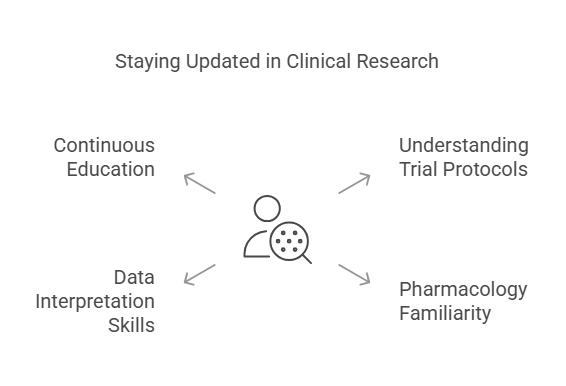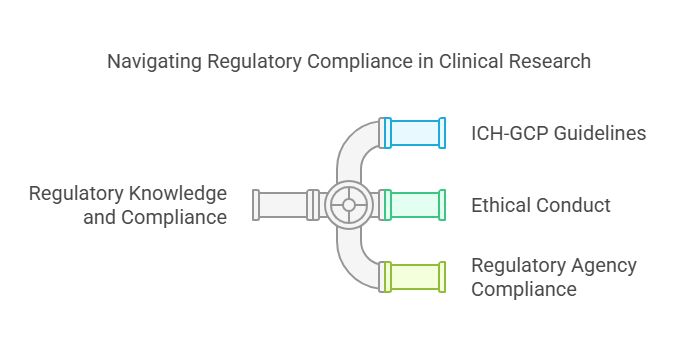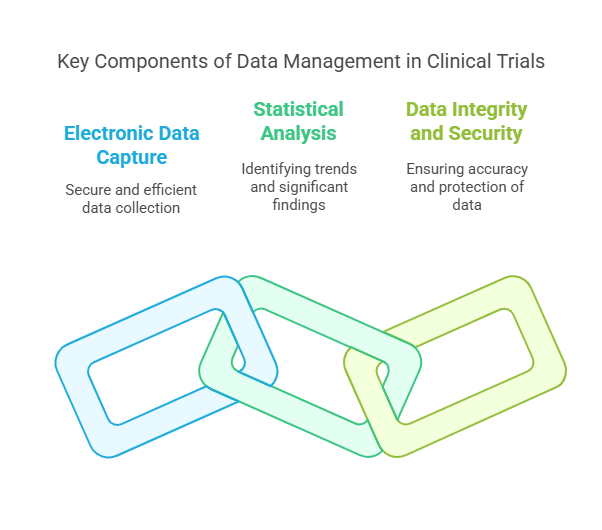Top Skills Every Clinical Research Professional Needs to Succeed
Clinical research is one of the most important aspects of the medical field and has the role of developing new treatments, medications, and interventions. At the heart of every clinical trial there is a clinical research professional who ensures that the trials are conducted ethically, safely and effectively. These professionals are charged with overseeing the different phases of clinical studies, including protocol development, through to data analysis, while ensuring that they are conducted in compliance with the appropriate standards.
To excel as a clinical research professional, a diverse skill set is required. In this blog, we will explore the key skills every clinical research professional needs to succeed in their career and provide insight into how to develop and enhance these abilities.
1. Scientific Knowledge and Expertise
At its heart, clinical research is science based. Clinical research professionals need a deep understanding of medical concepts, pharmacology, biology and healthcare practices. They must be able to interpret study data, assess safety concerns, and understand the underlying mechanism of the treatments being tested.
Key components of scientific knowledge for clinical research professionals include:
Understanding trial protocols & scientific methods.
Familiarity with pharmacology & drug development processes.
Ability to interpret clinical data & make informed decisions.
A clinical research professional must have science acumen that is dynamic and progressive in nature and thus requires updating at regular intervals to encompass the latest findings and innovations. Seminars, workshops and advanced certification courses like Clinical Research Coordinator Certification can attend to stay updated with industry standards.
2. Regulatory Knowledge and Compliance
Regulatory compliance is very important in clinical research so that the trials are properly ethical and within the safety limits. Clinical research professionals need to know about the regulations that are applicable at the local as well as international level, for example, the guidelines of the U.S. Food and Drug Administration (FDA), the International Council for Harmonisation (ICH).
Clinical research professionals should be able to:
Comprehend and adhere to ICH-GCP guidelines
Ensure ethical conduct
Maintain compliance with regulatory agencies like the FDA or EMA
It is important to avoid delays, fines or even trial termination by staying current with regulatory knowledge. Attaining certifications for instance the ICH-GCP Certification can enhance your understanding of the ethical and regulatory frameworks that regulate clinical trials.
3. Project Management Skills
Running a clinical trial is like running a large project, which can involve several stakeholders, tight deadlines, and many moving parts. In order to run a trial effectively, as a clinical research professional, you need to have strong project management skills.
Essential project management responsibilities include:
Developing and adhering to project timelines.
Resource allocation and budgeting
Delegating tasks to team members
Monitoring trial progress
Successful project management also requires adaptability. Clinical trials may encounter unforeseen challenges, such as patient recruitment issues or regulatory changes, and professionals must quickly pivot to keep the study on track.
4. Attention to Detail
Attention to detail is one of the most critical skills for clinical research professionals. Even the smallest error in data collection or trial documentation can compromise the integrity of a study, leading to incorrect conclusions, safety concerns, or regulatory sanctions.
To avoid mistakes, clinical research professionals should:
Meticulously document trial activities
Adhere strictly to trial protocols & standard operating procedures (SOPs).
Conduct regular audits to identify & correct potential errors before they escalate.
Precision in every aspect of clinical trial management is essential to ensure data accuracy and participant safety.
5. Ethical Judgment and Integrity
Ethics are the backbone of clinical research. Clinical research professionals are entrusted with the safety and well-being of study participants. They must ensure that trials are conducted with full transparency, that participants are informed of risks, and that the trial complies with ethical guidelines.
Key ethical responsibilities include:
Ensuring informed consent is obtained from all participants.
Monitoring patient safety throughout the trial and reporting adverse events promptly.
Maintaining confidentiality of patient data and trial results.
Understanding ethical guidelines like those set by the Declaration of Helsinki or the Belmont Report is crucial for maintaining the integrity of a clinical trial. Clinical research professionals can benefit from ethics training, such as the Advanced Principal Investigator Physician Certification, to enhance their ethical decision-making skills.
6. Communication and Interpersonal Skills
In clinical research, good communication is essential. Clinical research professionals are the go-between for trial sponsors, regulatory bodies, healthcare providers, and participants. Without clear communication, no one understands the objectives, procedures, and potential risks of the trial.
Effective communication involves:
Explaining complex medical terms in a way that participants can easily understand.
Collaborating with various teams, such as researchers, healthcare providers, and administrative staff.
Reporting trial progress and data clearly and concisely to regulatory authorities and sponsors.
Interpersonal skills are also crucial. Building rapport with participants, team members, and stakeholders fosters collaboration and smooth trial progression.
7. Data Management and Analysis
During clinical trials, data is gathered from a wide variety of sources, including patient records, lab results, and clinical outcomes. It is crucial for clinical research professionals to understand and effectively manage and analyze this data to ensure its accuracy and security.
Core data management skills include:
Proficiency in electronic data capture (EDC) systems for secure and efficient data collection.
Ability to conduct statistical analysis to identify trends, patterns, and significant findings in trial data.
Ensuring data integrity and security, especially when dealing with sensitive patient information.
Data management systems and statistical software are integral to clinical research, and professionals should continually hone these skills to stay effective in their roles.
8. Problem-Solving and Critical Thinking
Clinical research professionals frequently encounter unexpected challenges, such as recruitment delays, regulatory hurdles, or unanticipated adverse events. Critical thinking and problem-solving skills are essential for addressing these issues without compromising the trial’s integrity.
Professionals in this field must:
Analyze complex situations to identify the root cause of problems.
Develop creative solutions to keep the trial on track.
Anticipate potential risks and implement contingency plans.
A strong problem-solving mindset allows clinical research professionals to navigate the complexities of clinical trials with confidence.
9. Adaptability and Resilience
The clinical research landscape is evolving with technological advancements, regulatory changes, and new scientific discoveries. Adaptable, new technologies willing to learn, and staying updated are essential for clinical research professionals.
Adaptability involves:
Learning new software and tools used in clinical trial management.
Staying updated on changes in regulations and industry trends.
Adjusting trial protocols and timelines as needed to accommodate unforeseen challenges.
Resilience is also key, as clinical trials can be long and demanding. Clinical research professionals must remain focused and motivated, even when faced with setbacks.
Final Thoughts
It takes a combination of scientific knowledge, regulatory expertise, ethical judgment, and soft skills to become a successful clinical research professional; mastering the skills discussed in this blog will not only enhance your career but also contribute to advancing medical science by ensuring that clinical trials are conducted safely, ethically, and efficiently.
If you're looking to develop these skills and excel in your career, consider pursuing advanced certifications and training through resources like the CCRPS and their specialized courses, such as the Clinical Trials Assistant Training.
Explore Courses for Clinical Research Career
Courses Available:
Reference Links:
Frequently Asked Questions (FAQs)
-
To become a clinical research professional, one typically needs a bachelor’s degree in life sciences, nursing, or a related field, along with relevant certifications such as Clinical Research Coordinator Certification.
-
Clinical research professionals stay updated by attending workshops, seminars, and continuing education courses. Certifications like ICH-GCP Certification are also pursued to keep up with regulatory standards.
-
Ethics play a critical role in ensuring that clinical trials are conducted with respect for participants, ensuring informed consent, maintaining confidentiality, and adhering to ethical guidelines like the Declaration of Helsinki.
-
Data management is crucial for ensuring the accuracy, integrity, and security of data collected during clinical trials. This includes managing electronic data capture systems and conducting statistical analysis.




